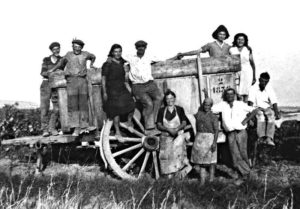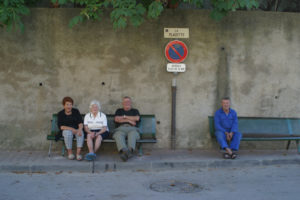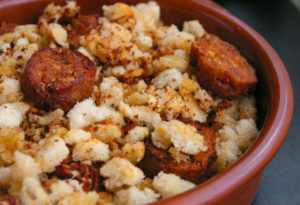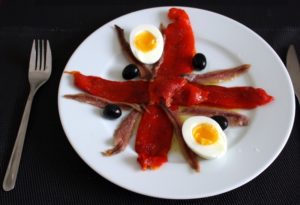Pastoret
He was called André Ferrer but everyone called him Pastoret. This, in local patois, means shepherd because this is what he had been all his life – tending his flock of up to 600 sheep until his late 70’s. So chuffed was he with his nickname that he had it engraved in stone over the door of his little house nextdoor to mine.
 Like many inhabitants in this part of France, his family had left troubled Spain in the early 1900’s. The hungry families came to the Languedoc hoping to find work as migrant grape-pickers but found that there were paid jobs all year around, and so they stayed.
Like many inhabitants in this part of France, his family had left troubled Spain in the early 1900’s. The hungry families came to the Languedoc hoping to find work as migrant grape-pickers but found that there were paid jobs all year around, and so they stayed.
They worked hard for their French landlords – pruning or planting vines and tending livestock in winter, tying the vines in spring, picking peaches and apricots in summer and gathering olives in autumn after the grape harvest.. They lived frugally off the land and with the money they saved they bought their own vineyards. You only need to look up the telephone directory to see that most of Mirepeisset’s inhabitants still sport Spanish names – Campos, Fuentes, Sanchez, Lopez, Calas, Sabater… – all of them highly respected members of society and well established employers in their own right now.
 Pastoret was 80 by the time I arrived in the village. We were next-door neighbours and we got on like a house on fire. He was still very active – getting on his bike everyday to inspect whatever crops or properties he still had scattered about. And depending on the season he still went wild-boar hunting on Wednesdays with his dogs and his mates. Otherwise he spent his afternoons philosophizing (or perhaps rather pontificating!) on the benches in the Placette. Despite being retired, he would already have had his breakfast by 6am. Most probably sardinas (grilled and marinated in olive oil by himself the day before) and served with plenty of raw onions. Or perhaps a fried egg with salty mountain ham and a hunk of bread. Oh, and let’s not forget to mention his glass of wine – yes, at dawn, and his only glass of the day.
Pastoret was 80 by the time I arrived in the village. We were next-door neighbours and we got on like a house on fire. He was still very active – getting on his bike everyday to inspect whatever crops or properties he still had scattered about. And depending on the season he still went wild-boar hunting on Wednesdays with his dogs and his mates. Otherwise he spent his afternoons philosophizing (or perhaps rather pontificating!) on the benches in the Placette. Despite being retired, he would already have had his breakfast by 6am. Most probably sardinas (grilled and marinated in olive oil by himself the day before) and served with plenty of raw onions. Or perhaps a fried egg with salty mountain ham and a hunk of bread. Oh, and let’s not forget to mention his glass of wine – yes, at dawn, and his only glass of the day.
 He was also fond very fond of Migas for breakfast – one of the many hearty Spanish dishes created out of necessity by shepherds and hunters – stale breadcrumbs moistened with water, olive oil and garlic then fried, and sometimes served
He was also fond very fond of Migas for breakfast – one of the many hearty Spanish dishes created out of necessity by shepherds and hunters – stale breadcrumbs moistened with water, olive oil and garlic then fried, and sometimes served  with wild greens. Pastoret liked to add some chopped ham or a few slices of chorizo to his. Or grilled calçots (wild leeks) which he may have gathered from vineyards.
with wild greens. Pastoret liked to add some chopped ham or a few slices of chorizo to his. Or grilled calçots (wild leeks) which he may have gathered from vineyards.
Immediatley after his breakfast Pastoret would start preparing his lunch – which he would eat between 10 and 11am. Perhaps an asadillo – roasted and peeled red peppers dressed with garlic. I would come into his kitchen and there they would lie all ready and glistening in olive oil with some fresh anchovies delicately draped across..
When I took him to the hospital from which he never returned, I found out that he didn’t know how to read nor write his name. Embarrassed, he said that he’d forgotten his glasses and asked if I could fill in the forms. Had he always pretended to read the local news rag on the benches of Mirepeisset? Yet I have rarely met a man as clever and wise as he.. He knew so many things – ancient cures and housewives remedies, primordial wisdoms, the mysterious ways of the moon, incredibly accurate weather patterns… He was also impeccably clean and proper – always smelling of that deliciously fresh, splash-on Eau de Cologne that so many older Spanish men use.
His big passion was rugby. He shouted at the French teams, accusing them of being worthless, but he loved, cheered and admired the Irish teams. I’d often watch a match with him and if the Irish played, I’d bring two small cans of Guinness with me. It was the only alcohol he drank towards the end of his life because he, like the rest of the world, believed that Guinness is good for you. We’d split one can between us for the first half, and downed the second after mi-temps..
His other big love of his life was his dog Hector – obedient, faithful and a great hunting dog. One day he asked me whether I could take a picture of him with his dog. He had scrubbed up, put on his best clothes and installed himself on one of the Placette benches. I took some photos, but he never saw them – Pastoret died 4 days after. Perhaps he knew.
